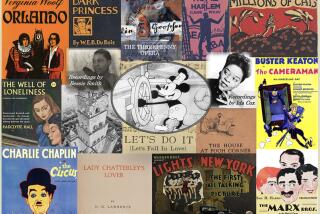Review: ‘The Idealist’ is a riveting look at activist Aaron Swartz and the free culture movement

- Share via
Anyone who’s spent much time on the Internet has heard the slogan “information wants to be free.” Coined by author Stewart Brand, it’s become a rallying cry for, yes, people who are justifying their free downloads but also for those who fight restrictive copyright laws, advocating for open access to information for everyone.
Yet as Justin Peters points out in his new book, “The Idealist: Aaron Swartz and the Rise of Free Culture on the Internet,” the quote doesn’t tell the whole story. Brand followed up his much-circulated aphorism with this caution about intellectual property: “[Information] wants to be expensive because it can be immeasurably valuable to the recipient. That tension will not go away.”
It was that tension that led to the death of Aaron Swartz in 2013. He was 26.
Swartz was a brilliant high school dropout turned computer programmer who helped develop the code base of the popular website Reddit when he was just 18, as well as Creative Commons, which allows users to share their photographs and other creations freely. He was mercurial and impulsive but widely admired by Internet denizens three times his age.
As a kind of free culture protest, Swartz had downloaded millions of academic articles from the digital library JSTOR and made repeated efforts to allow others to access them. After he was arrested and charged in a federal data theft case, facing 30 years in prison — charges that many in his community, including attorney Lawrence Lessig, thought were heavy-handed — Swartz committed suicide.
It’s no surprise that Swartz has become a martyr to the free culture movement, which has long objected to what it sees as the federal government’s aggressive tactics in enforcing copyright laws.
See more of our top stories on Facebook >>
However, although “The Idealist” is certainly respectful of Swartz and his legacy, it’s not a hagiography (which Swartz, known for his sometimes brutal honesty, would likely have hated). Peters’ book is a fascinating look not only at one of the Internet’s most beloved whiz kids but also at the way copyright works and doesn’t work in America today.
“The Idealist” is only partly a biography of Swartz; it is, as Peters writes, “a provisional narrative introduction to the story of free culture in America, using Swartz’s life as a lens on the rise of information sharing in the digital age.” And although we learn a great deal about the young activist, we learn even more about the past and present of copyright law and the free culture movement.
Peters starts, fittingly, with the Copyright Act of 1790, which gave authors ownership of their works for a maximum of 28 years. A century later, Congress passed the first international copyright act, which gave protection to some foreign creators. It was a watershed moment, Peters writes: “The rhetorical logic of the international copyright debate ... led to the development and consecration of the notion of copyright as a property right, and literature as property.”
Of course, it didn’t stop there. In 1909, the government extended copyright terms to a maximum of 56 years and then in 1998 to the life of the author plus 70 years. The changes came after pressure on Congress from the Walt Disney Co.; although the 1998 act was formally named after Rep. Sonny Bono, who had died that year, many critics referred to it as the “Mickey Mouse Protection Act.”
The extensions were passed with the support of artists like musician Don Henley, who, Peters notes archly, explained to Congress “how unjust it would be if, in 2050, his grandchildren were unable to collect the royalties from ‘Tequila Sunrise.’”
Opponents of the copyright extensions were appalled by the government’s actions, and their discontent helped spawn the free culture movement, which believes, as Peters puts it, that “the Internet ought not to be considered a bookstore so much as an infinite library, its contents made available for the benefit of all.”
And that’s where young Swartz comes in. He was an early convert to the free culture ideology, and he thought he knew how to fight what he saw as an unfair system that benefited the rich. “We need to take information, wherever it is stored, make our copies and share them with the world,” Swartz wrote in 2008, foreshadowing the controversial actions he would make two years later. “We need to download scientific journals and upload them to file sharing networks.”
Swartz didn’t get the chance to upload the millions of articles he downloaded, using a computer concealed on the campus of the Massachusetts Institute of Technology, to file sharing sites; he was arrested before he could do so. Peters doesn’t exactly blame Swartz for his legal troubles, but neither does he completely absolve him. Swartz, Peters writes, was afflicted “with ideological tinnitus, unable to escape the sound of social dysfunction and desperate to make others hear the ringing in his ears.”
While Peters’ history of copyright law is endlessly interesting — he’s fluent in both English and lawyer-speak, and he does a great job explaining sometimes arcane legislation — it’s his portrait of Swartz that makes “The Idealist” such a riveting book.
Although he was brilliant, handsome and witty, Swartz was a misfit, especially as a Stanford undergraduate, Peters writes. Swartz’s blog chronicled his failed, half-hearted attempts to fit in with his college peers, with “the tone of a priggish anthropologist studying some vulgar foreign culture.”
Peters hints that the young man might have struggled with mental illness, pointing to a short story Swartz wrote on his blog about a boy named Aaron who commits suicide. (The blog post was fictional, but that didn’t stop Swartz’s colleagues from calling the police, who broke down his apartment door to check on him.)
Swartz’s story is a dark one, and Peters doesn’t pull any punches describing the pain the young man lived through. But he can also be quite funny. “As long as man has lived in society, he has yearned to escape that society and run off to live in a cave,” Peters writes. “This dream is usually abandoned once the would-be escapee realizes that caves are uncomfortable and that society is where his things are.”
But Swartz, though wealthy, didn’t care much for things; his ideals were precious to him, not any objects. And that’s why he’s such a fitting subject for this excellent book — the free culture movement is full of true believers, and for better and for worse, there was never a believer more true than the young activist the world lost three years ago. “Aaron Swartz wanted to save the world,” Peters writes. “But the world was never going to let Aaron Swartz save himself.”
::
The Idealist: Aaron Swartz and the Rise of Free Culture on the Internet
Justin Peters
Scribner: 352 pp., $28
Schaub is a writer who lives in Austin, Texas.
More to Read
Sign up for our Book Club newsletter
Get the latest news, events and more from the Los Angeles Times Book Club, and help us get L.A. reading and talking.
You may occasionally receive promotional content from the Los Angeles Times.








